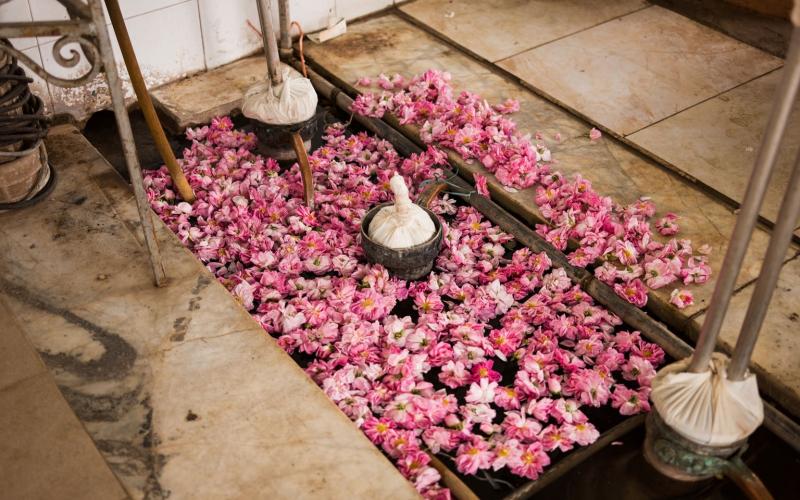The Scent of Roses
by NOOSHIN MAVADDATI
The city where I was born and currently live is called Sanandaj. It is the capital of Kurdistan province and is located in the west of Iran beside the Zagros Mountains. My city has cold, snowy winters and hot summers, and in the spring its plains are full of beautiful wildflowers and medicinal plants. Our house is located in the city center. We also have a garden house outside the city that sits on a five-thousand-square-meter plot of land on a highway that leads into the city. The front of our garden, which overlooks the highway, is our family’s source of income and has a machine shop and a large parking lot for heavy vehicles. At the back of the shop is a garden that is home to a pool of water that helps irrigate the land by means of a motor that pumps the water up from the well and into the field. The garden also has fruit trees and a small house where my family and I spend the summer holidays harvesting vegetables, flowers, and fruits.
When I was a teenager I went to the garden with my parents and my grandmothers. It was there that I learned from my grandmothers how to grow and harvest vegetables. Every year, my family and I planted many kinds of vegetables and crops. We kept what we needed and gave the surplus to our neighbors. Apart from the beauty of the garden, I still remember my exhaustion on those days I spent working there. Above all, I remember the time I spent with my family, especially my grandmothers.
When I grew older, I went to work in Tehran and returned to Sanandaj only on weekends; and every time I came back, I visited the garden. By then, the older generation had passed away and handed the responsibility for tending the garden to the younger generation. Instead of my grandmothers, it was my nieces and nephews who took care of the garden. I remember that during those days, I would pick strawberries for hours, and their aroma was so beautiful, I forgot to take even the smallest bite. On my return to Tehran, I would remember that I had not tasted a single berry
Now that my grandparents are no longer alive, and my parents are quite elderly, my family does not grow vegetables as we used to. There may not be many vegetables in our garden anymore, but the beautiful Damask rose lives on and multiplies every year. In the spring, when the roses are in full bloom, I return to Sanandaj to help dry the petals and prepare rose water. And when I do, I always remember that this rose is the same one from which ‘Abdu’l-Bahá offered a small container of perfume in response to a question from an Inuit who wanted to know more about the fragrance referred to in the Bahá’í Writings. The rose is the symbol of sweetness in many of the holy tablets — of the Word of God, the fragrance of heaven, and the feeling of spiritual bliss. The water distilled from this flower is the same rose water used to wash the Kaaba in Mecca; and, in traditional medicine, it is a cure for many illnesses. The rose is also featured in funeral services, for it is thought to relieve sorrows and calm the soul. In my experience, the scent of roses is the only fragrance that refreshes the breath, makes the thoughts expand, and fosters the feeling of well-being.
For me, the beautiful fragrance of the roses brings back sweet memories, strengthening my heart and igniting sparks of love and affection. Inhaling this fragrance, I remember that there are still people who love me, even if they are not here anymore, and it is their prayers that are sustaining me in my daily life. Even today, the garden in Sanandaj lives on, and, for me, it remains a symbol of the love of family, of beloved relatives sitting together and drinking tea in air made sweet by the wonderful aroma of roses. And today, whenever I sit in the garden in Sanandaj, I feel their prayers coming to me in the scent of the Damask rose.
 The Making of Rose Water
The Making of Rose Water
